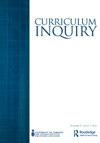在澳大利亚历史课程中参与过渡正义:时代、时间性和历史思考
IF 1.6
3区 教育学
Q2 EDUCATION & EDUCATIONAL RESEARCH
引用次数: 3
摘要
摘要关于历史教育在过渡时期司法议程中的作用的现有研究侧重于在广泛冲突后进行政权更迭或重建的社会,并经常将学科能力作为支持政治过渡的教育改革目标的一部分。然而,在澳大利亚等定居者殖民民主国家,过渡时期司法的取向引发了关于历史课程在过渡时期的作用的辩论,在过渡时期,已经规定了建构主义、基于学科的方法。尽管澳大利亚的“历史思维”一直是两极分化的单一叙事和解构主义范式之间的一条务实的中间道路,但本文认为,过渡正义问题将主观、当代和政治的教育回归到历史教育中,挑战了学科意义的范围,并使学科思维的公民承诺复杂化。通过讨论目前如何使用二阶历史思维概念来想象和参与时间的例子,本文探讨了学科历史课程相对于过渡正义的一些关键局限性。它提出了将学科范式扩展到新方向的替代方法,对其他参与过渡时期司法问题的社会具有重要影响。本文章由计算机程序翻译,如有差异,请以英文原文为准。
Engaging transitional justice in Australian history curriculum: Times, temporalities and historical thinking
Abstract Existing research on history education’s role in agendas of transitional justice is focused on societies undertaking regime change or rebuilding after extensive conflict and often centres disciplinary competencies as part of educational reform objectives to support political transition. However, the orientation towards transitional justice in settler colonial democracies such as Australia has prompted debate about the role of history curriculum in transitional contexts where constructivist, discipline-based approaches are already prescribed. While “historical thinking” in Australia has been a pragmatic middle way between polarised single-narrative and deconstructivist paradigms, this article argues that questions of transitional justice return the subjective, contemporary, and political to history education in ways that challenge the scope of disciplinary meaning-making and complicate the civic promises of disciplinary thinking. By discussing examples of how time is presently imagined and engaged using second-order historical thinking concepts, this article engages some key limitations of disciplinary history curriculum vis-à-vis transitional justice. It suggests alternate approaches that stretch the disciplinary paradigm in new directions that carry important implications for other societies engaged in questions of transitional justice.
求助全文
通过发布文献求助,成功后即可免费获取论文全文。
去求助
来源期刊

Curriculum Inquiry
EDUCATION & EDUCATIONAL RESEARCH-
CiteScore
3.10
自引率
17.60%
发文量
37
期刊介绍:
Curriculum Inquiry is dedicated to the study of educational research, development, evaluation, and theory. This leading international journal brings together influential academics and researchers from a variety of disciplines around the world to provide expert commentary and lively debate. Articles explore important ideas, issues, trends, and problems in education, and each issue also includes provocative and critically analytical editorials covering topics such as curriculum development, educational policy, and teacher education.
 求助内容:
求助内容: 应助结果提醒方式:
应助结果提醒方式:


